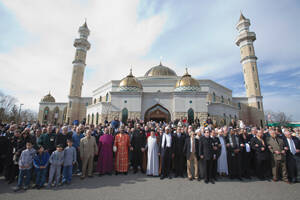A new study by the Pew Research Center’s Forum on Religion and Public Life notes an uptick on social intolerance and government restrictions on religion around the world and in the United States between 2009 and mid- 2010. Restrictions on religion rose not only in countries that already maintained high government restrictions or religious hostilities, such as Indonesia and Nigeria, but also in many countries that began the study period with low or moderate restrictions or hostilities, like Switzerland and the United States. Over all, restrictions increased at least somewhat in 66 percent of the 197 countries and territories included in the study and decreased in 28 percent.
Pew researchers report that the United States moved from the lower end of the moderate range of social hostilities to religion to the range’s upper end. A key factor behind the U.S. increase was a spike in religion-related terrorist attacks. In November 2009, for instance, U.S. Army Major Nidal Hasan killed 13 people and wounded 32 others at a military base in Fort Hood, Tex. In December 2009 Umar Farouk Abdulmutallab, a Nigerian national, attempted to set off a bomb hidden in his underwear while aboard a Detroit-bound aircraft; and in May 2010, Faisal Shahzad, a Pakistani-born resident of Bridgeport, Conn., attempted to detonate a car bomb in Times Square in New York.
The Pew study also reports an increase in the number of incidents at the state and local level in the United States, in which members of religious groups faced restrictions on their ability to practice their faith. Some were prevented from wearing certain religious attire or symbols, including beards, in judicial settings or in prisons, penitentiaries or other correctional facilities; some religious groups also faced difficulties in obtaining zoning permits to build or expand houses of worship, religious schools or other religious institutions.
In Murfreesboro, Tenn., for example, some residents attempted in the spring of 2010 to block the construction of a mosque, claiming that Islam is a “political ideology rather than a religion.” The mosque officially opened in August 2012, but opponents are still challenging it in federal court.
According to the study, restrictions on religion increased in each of the five major regions of the world, including the Americas and sub-Saharan Africa, the two regions where overall restrictions had been declining. The share of countries with high or very high restrictions on religious beliefs and practices rose from 31 percent in the year ending in mid-2009 to 37 percent in the year ending in mid-2010. Because some of the most restrictive countries also have high populations, three-quarters of the world’s approximately seven billion people live in countries with high government restrictions on religion or high social hostilities involving religion, up from 70 percent a year earlier.
The rising intolerance was tracked by increases in malicious acts and violence motivated by religious hatred or bias, as well as increased government interference with worship or other religious practices. A constitutional referendum in Switzerland in November 2009 banned the construction of minarets on mosques in the country. In Indonesia more than two dozen churches were forced to close because of pressure from Islamist extremists or local officials. And in Nigeria violence between Christian and Muslim communities, including a series of deadly attacks, escalated throughout the period.








